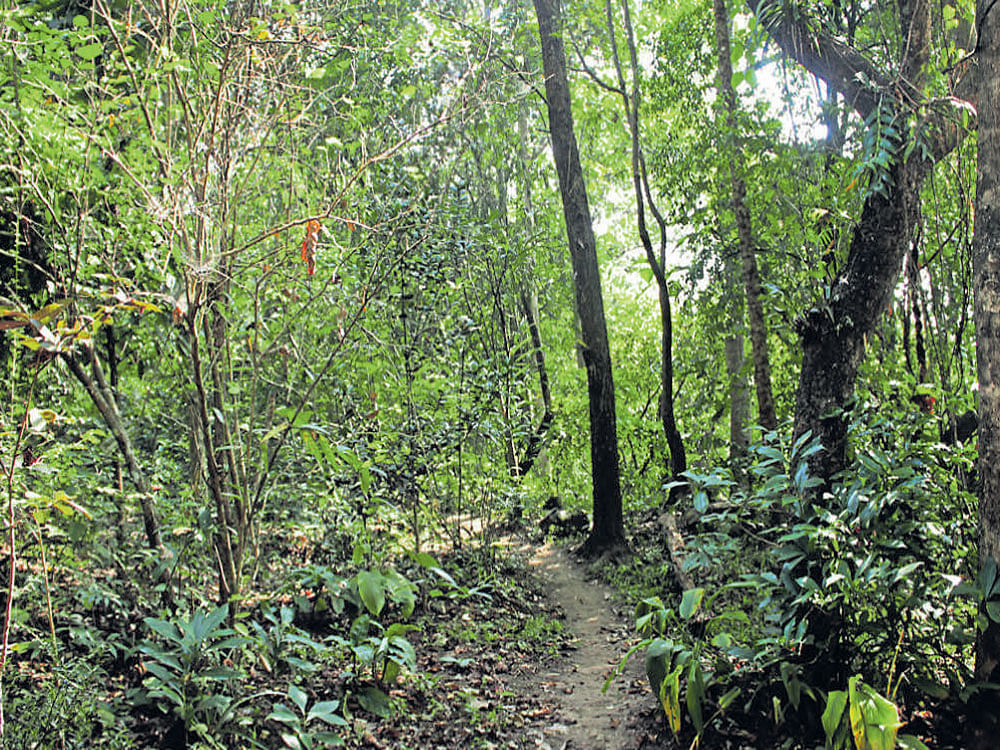
We follow a serpentine mud and rock-strewn path, tunnelled by lush trees that create a brilliant monochrome in green. It is interspersed sporadically with plants throwing up yellow-orange blossoms with flitting butterflies perching on them. As we trek up, the quiet of our environs is broken only by soothing folk music from the foothills below.
Following half an hour of climbing that is not too steep, we find ourselves in
Punshilok, which is part of the Langol Hill range, about six km away from the hub of Imphal Valley, Manipur. We immediately warm to its environs and soak in the calm radiance of the hills. Punshilok literally means “Spring of Life” and derives its name from King Luwang Ningthou Punshiba, from whom the Manipuri people trace their descent.
Though Punshilok enjoys rich history, it fell into decadence in contemporary times. It became barren, denuded of its vegetation, due to forest fires and indiscriminate cutting of trees by the villagers.
However, thanks to the committed efforts of a group of people, it now pulsates with new life. Wildlife and Habitat Protection Society (WAHPS), which currently has 20 volunteers, was founded in 2003 and is the brainchild of Moirangthem Loiya Ngamba, its founder president.
Cleaning Punshilok
Loiya, who began scouting for land to create his green area, came upon Punshilok at the suggestion of a farmer working at its foothills. “The place was barren except for some wild weeds. The stream here had plenty of water but was not usable by human beings because cows and cattle were drinking from it,” reveals Loiya.
Along with a few friends, he began clearing the area of weeds. The stream was cleansed and it became a major source of drinking water for the people of the valley. The youngsters relentlessly worked towards greening Punshilok. Loiya made Punshilok his home for six years and lived here alone in a seven-feet-by-five-feet hut that he built for himself. “For me, this was like a baby I had to take care till it grew up. I needed to nurture and protect it,” explains Loiya.
When the “baby” began to grow, and showed good health, Loiya employed a
caretaker who now guards Punshilok. Apart from afforestation work in the region, WAHPS is involved in protecting it as a natural habitat for wild animals such as barking deer, porcupine, pangolin and several species of snakes. “Ever since we stepped in to protect this area, hunting and poaching have stopped,” says Bidyananda, a volunteer with WAHPS. Every November, WAHPS members camp on the hill and make fire line in order to protect it from forest fires.
Punshilok now fibrillates with renewed energy. It is home to over 200 plant species, 20 species of bamboo, some varieties of orchids, herbs and medicinal plants. The Ministry of Environment, Forest and Climate Change of the Government of India, to whom the land belongs to, appreciated the yeoman service provided by WAHPS
towards restoration of the region. “Since the authorities realise that we are not attached to the land, but to nature, and are committed towards protecting and preserving it, they allow us to work here,” reveals Loiya.
The work done by WAHPS is in itself a strong message for individuals, groups and organisations that come to Punshilok to celebrate environment-related occasions. “Awareness is the key,” says Loiya. “After all we are a poor state. People are poor, and in order to survive they are forced to exploit the environment. But we need to impress upon them that by causing damage to the environment, they are only reinforcing their poverty.”
Punshilok is a heartening example of stupendous transformation that was initiated voluntarily by young adults to nurture nature. As nature, god and human commune in serene silence here, one only hopes to see more such efforts mushroom not only in Manipur, but across India.